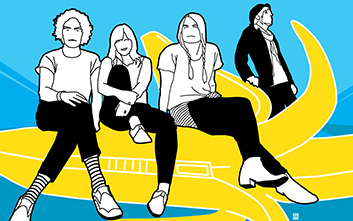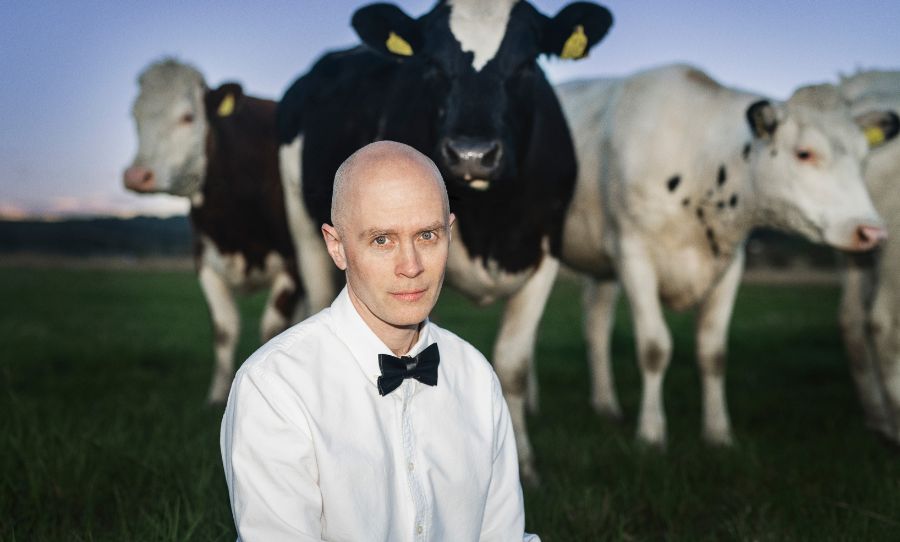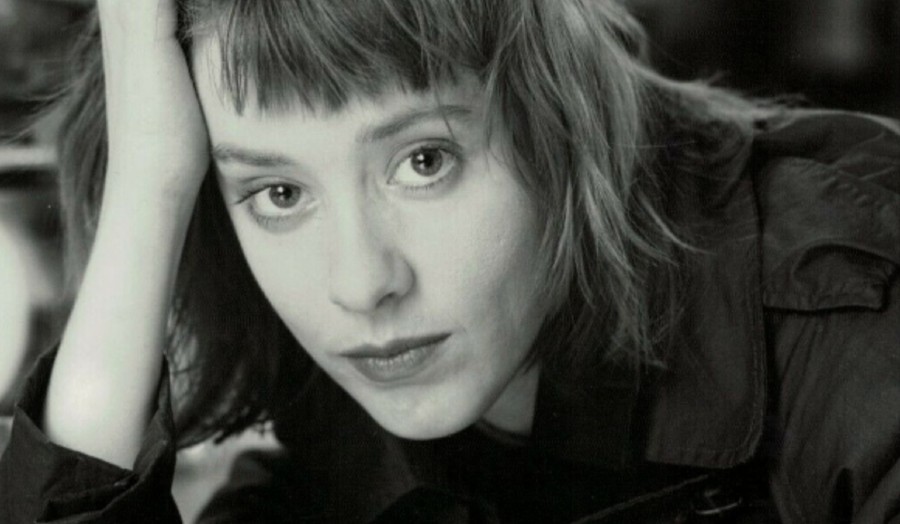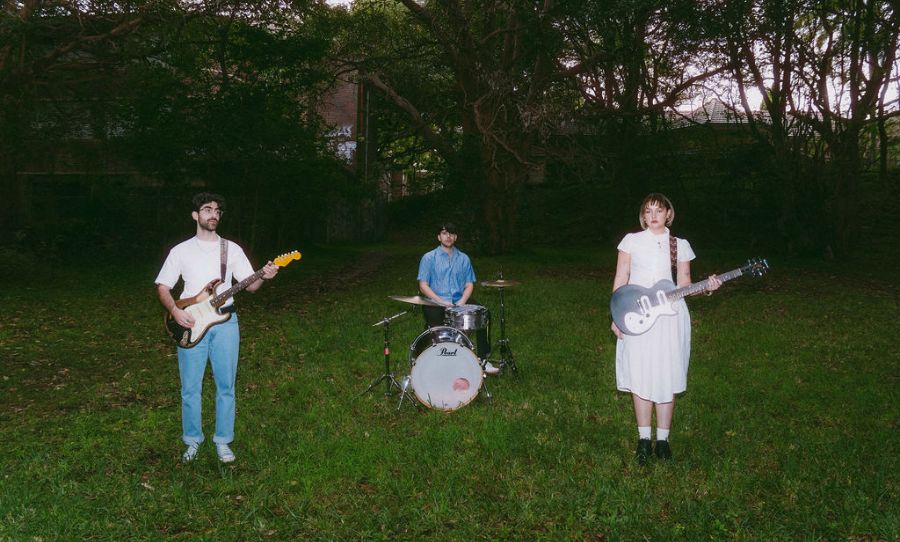As a band, a career that spans more than two decades often boasts more than just an extensive back catalogue. The Dandy Warhols can certainly lay claim to more than just a shit ton of music, as a band who not only carved out their own distinctive sound but also became a catalyst for more than just their own music.
Tracks like Bohemian Like You and We Used To Be Friends have stuck around as songs that epitomise the early 2000’s. Currently touring the world off the back of Distortland, perhaps their most shoegazey effort to date, we caught up with frontman Courtney Taylor-Taylor ahead of the band’s arrival in Australia.
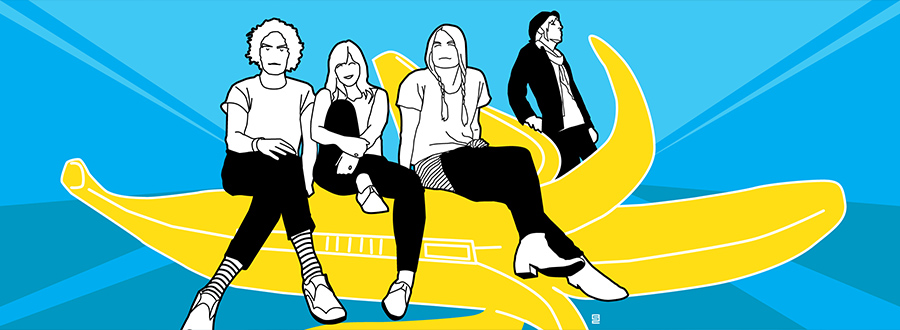
Courtney Taylor-Taylor of The Dandy Warhols spares no bullshit chatting about about Distortland, the lack of decent bands in ’94, how to suck at business.
HAPPY: Congratulations on Distortland, are you still in celebratory mode or thinking about the next thing?
COURTNEY: I would definitely love to just smoke a shit ton of pot, put the headphones on and listen to Distortland… It’s just awesome I love it.
HAPPY: Yep, that sounds pretty good.
COURTNEY: Right now we’re working on some new stuff already, and then of course we’re on tour – and when you’re touring the world not much else happens in your head. We are winding down, the next few months will be the end of the tour then we’ll be definitely deep into whatever our next record’s going to be.
HAPPY: You were once quoted as saying you formed the band because you “needed music to drink to”. Is that still true?
COURTNEY: In ’94 there were no great bands. It was a horrible time for music and now there’s lots of great bands. I go to a different city everyday, I go into coffee shops or bars and hear The Growlers or Tame Impala. There’s fucking great bands now and I am so happy about it. But we just make music because, you know, we have to. We feel compelled to emotionally, it’s psychology, it’s self help. Making music is how you deal with being a kind of fucked up person.
HAPPY: You’ve described rock as art, as opposed to the “business” of pop music, is that how you approach what you do with the band?
COURTNEY: Yeah, we wouldn’t really know how to do it correctly as a business. We generally fuck everything up except the music and the film… all business shit, we fuck up. We make horrible, career shattering mistakes on the business side all the fucking time, but at least we get the music right.
HAPPY: Distortland started out quite literally as basement tapes and historically you haven’t favoured hi-tech studios, can you tell us a bit more about the recording?
COURTNEY: Almost all of them began in my basement, on the same cassette tape four track recorder that I’ve been recording on since I was a teenager. And once I get a few ideas together, a few months later when I’m feeling techy I plug that into my computer and I load in all those little ideas and parts of new songs. Then I arrange those digitally like dance music; chopping parts around. I’ll maybe lay some more tracks down, but I like to leave them pretty skeletal so there’s lots for the band to do. Then we take it to the studio and people fuck around with it.
The really loud guitars, the drums, they all get done at the studio, because you can’t really get those sounds to be as solid in your basement. Better pre-amps, better microphones, more interesting microphones! Then people take it home and do their noodley, late night, dreamy… when you’ve got time on your hands to noodle, that’s where really great creativity happens, I think.
More often than not when you’re in a studio, you’ve got an engineer there and the clock is ticking, and you’re paying for it. Home is where a lot of great shit happens, but the structure and the technical stability of the thing are – I mean there’s not a whole lot of consistency but some things work better at the studio, and some things are better in your basement.
HAPPY: So you work as a whole band across the recording process, it’s pretty democratic?
COURTNEY: Yeah, it’s nice to split it up. If you listen to the same song everyday, you get lost and you don’t know what it is anymore. So if you’ve been gone for three weeks, you come back with fresh ears and you can say “Dude that high hat is completely out of control with the shaker… or it’s trying to hard, it needs to be more lo-fi”. That can get you back to where you’re supposed to be.
HAPPY: The album feels like it has even more of a shoegaze, psych influence behind it than your previous records?
COURTNEY: It starts with the most shoegazer song we’ve ever made, which is Search Party. And it ends with the other most shoegazer song we’ve ever done, Doves. It’s got that going for it, but we’ve always been a shoegazer band at the end of the day; we are rocky and Neil Young-y, Bowie-y and Duran-y… but it’s all pretty shoegazey.
HAPPY: The Dandy Warhols are known for making awesome video clips, and you’ve already put out some great ones with Distortland. What made you want to put Joe Dellasandro and furries together for the clip for You’re Killing Me Again?
COURTNEY: I thought that the furries were a good metaphor for the people around him and the Warhol scene when he was in New York City. Kind of like what the scene turned into after Andy died. I asked Joe a lot about his life after Warhol, and I was very interested in that. He became a very serious alcoholic for quite a while, then he moved to New York and it got really bad, really fucked up in the scene. And then one of the women in that scene got him out of that, kind of cleaned him up, moved him to Hollywood and they’ve been married since the late 80’s. And that’s the story, the Joe Dellasandro story.
HAPPY: You will be touring Australia at the end of this month, what can we expect to hear at your shows?
COURTNEY: We probably do six or seven song from Distortland some nights, or we’ll do four or five… just depending on how inspired we feel and how many times in a row we’ve played them. We mix up our set every night.
HAPPY: You’ll be coming to the end of a long tour, so imagine you need to change it up for your own sanity?
COURTNEY: Yeah, we don’t really play the same set twice anymore. We’re always moving things around, then a song will feel hard to get into a different part of the set so we might take it out. Replace it with something else for a week or two or whatever. We just have so many fucking song now! Eight records and then all the B-sides and the covers… we’ve just got a ton of shit so that helps to draw from.
That’s one philosophy you know, but the other philosophy is that you hammer out the perfect set. And then you keep playing that set over and over until it becomes like one perfect song, all the way through. Where there’s never silence and the sound morphs into the next song… and then it drips away and a new song emerges from the ashes of the previous song. There’s a lot of theories like that but right now we’re doing the “fuck it, change it every night”.
HAPPY: For so many people, your songs really epitomise a specific time in their lives. Do you still get a kick out of that or are you more focused on current projects and the next thing?
COURTNEY: Oh God, we play tons of our old songs! And the thing that turned out to be very smart is that, when I put the band together we just were artists who had similar ideas about great music and great film, theatre and literature. We put likeminded people together and then wrote very simple songs, and what’s great is those songs are still very powerful because they’re easy to play. They’re not a technical exercise, you can actually feel them while you play them. You can be a listener too, you’re not engrossed in trying to technically perform the fucking thing with accuracy. They’re simple, you bash ‘em out, get the groove up and running and you sing your heart out.
